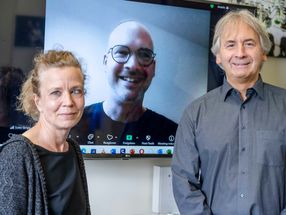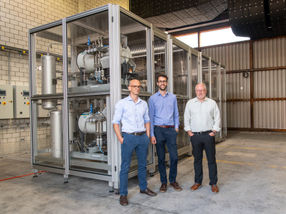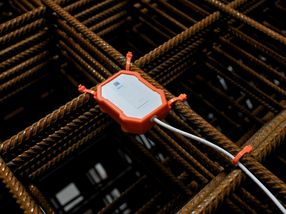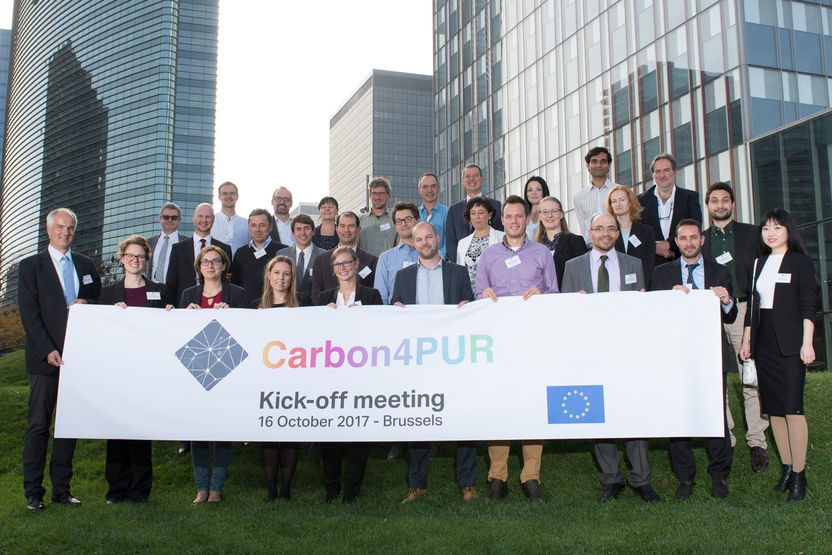Wood to Supercapacitors
Electrode materials from ultrathin carbon nanofiber aerogels derived from cellulose
carbon aerogels are ultralight, conductive materials, which are extensively investigated for applications in supercapacitor electrodes in electrical cars and cell phones. Chinese scientists have now found a way to make these electrodes sustainably. The aerogels can be obtained directly from cellulose nanofibrils, the abundant cell-wall material in wood, finds the study.
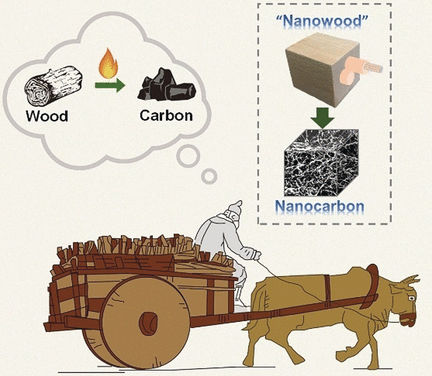
© Wiley-VCH
Supercapacitors are capacitors that can take up and release a very large amount of energy in a very short time. Key requirements for supercapacitor electrodes are a large surface area and conductivity, combined with a simple production method. Another growing issue in supercapacitor production—mainly for smartphone and electric car technologies—is sustainability. However, sustainable and economical production of carbon aerogels as supercapacitor electrode materials is possible, propose Shu-Hong Yu and colleagues from the University of Science and Technology of China, Hefei, China.
Carbon aerogels are ultralight conductive materials with a very large surface area. They can be prepared by two production routes: the first and cheapest starts from mostly phenolic components and produces aerogels with improvable conductivity, while the second route is based on graphene- and carbon-nanotube precursors. The latter method delivers high-performance aerogels but is expensive and non-environmentally friendly. In their search for different precursors, Yu and colleagues have found an abundant, far less expensive, and sustainable source: wood pulp.
Well, not really wood pulp, but its major ingredient, nanocellulose. Plant cell walls are stabilized by fibrous nanocellulose, and this extractable material has very recently stimulated substantial research and technological development. It forms a highly porous, but very stable transparent network, and, with the help of a recent technique—oxidation with a radical scavenger called TEMPO—it forms a microporous hydrogel of highly oriented cellulose nanofibrils with a uniform width and length. As organic aerogels are produced from hydrogels by drying and pyrolysis, the authors attempted pyrolysis of supercritically or freeze-dried nanofibrillated cellulose hydrogel.
As it turns out, the method was not as straightforward as expected because ice crystal formation and insufficient dehydration hampered carbonization, according to the authors. Here, a trick helped. The scientists pyrolyzed the dried gel in the presence of the organic acid catalyst para-toluenesulfonic acid. The catalyst lowered the decomposition temperature and yielded a “mechanically stable and porous three-dimensional nanofibrous network” featuring a “large specific surface area and high electrical conductivity,” the authors reported.
The authors also demonstrated that their wood-derived carbon aerogel worked well as a binder-free electrode for supercapacitor applications. The material displayed electrochemical properties comparable to commercial electrodes. The method is an interesting and innovative way in which to fabricate sustainable materials suitable for use in high-performance electronic devices.
Original publication
Si‐Cheng Li, Bi‐Cheng Hu, Dr. Yan‐Wei Ding, Prof. Hai‐Wei Liang, Chao Li, Dr. Zi‐You Yu, Dr. Zhen‐Yu Wu, Prof. Wen‐Shuai Chen, Prof. Shu‐Hong Yu; "Wood‐Derived Ultrathin Carbon Nanofiber Aerogels"; Angew. Chem.; 2018
Si‐Cheng Li, Bi‐Cheng Hu, Dr. Yan‐Wei Ding, Prof. Hai‐Wei Liang, Chao Li, Dr. Zi‐You Yu, Dr. Zhen‐Yu Wu, Prof. Wen‐Shuai Chen, Prof. Shu‐Hong Yu; "Wood‐Derived Ultrathin Carbon Nanofiber Aerogels"; Angew. Chem. Int Ed.; 2018
Most read news
Original publication
Si‐Cheng Li, Bi‐Cheng Hu, Dr. Yan‐Wei Ding, Prof. Hai‐Wei Liang, Chao Li, Dr. Zi‐You Yu, Dr. Zhen‐Yu Wu, Prof. Wen‐Shuai Chen, Prof. Shu‐Hong Yu; "Wood‐Derived Ultrathin Carbon Nanofiber Aerogels"; Angew. Chem.; 2018
Si‐Cheng Li, Bi‐Cheng Hu, Dr. Yan‐Wei Ding, Prof. Hai‐Wei Liang, Chao Li, Dr. Zi‐You Yu, Dr. Zhen‐Yu Wu, Prof. Wen‐Shuai Chen, Prof. Shu‐Hong Yu; "Wood‐Derived Ultrathin Carbon Nanofiber Aerogels"; Angew. Chem. Int Ed.; 2018
Topics
Organizations
Other news from the department science

Get the chemical industry in your inbox
By submitting this form you agree that LUMITOS AG will send you the newsletter(s) selected above by email. Your data will not be passed on to third parties. Your data will be stored and processed in accordance with our data protection regulations. LUMITOS may contact you by email for the purpose of advertising or market and opinion surveys. You can revoke your consent at any time without giving reasons to LUMITOS AG, Ernst-Augustin-Str. 2, 12489 Berlin, Germany or by e-mail at revoke@lumitos.com with effect for the future. In addition, each email contains a link to unsubscribe from the corresponding newsletter.























